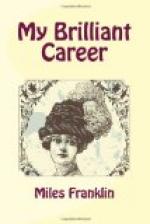My father was a swell in those days—held Bruggabrong, Bin Bin East, and Bin Bin West, which three stations totalled close on 200,000 acres. Father was admitted into swelldom merely by right of his position. His pedigree included nothing beyond a grandfather. My mother, however, was a full-fledged aristocrat. She was one of the Bossiers of Caddagat, who numbered among their ancestry one of the depraved old pirates who pillaged England with William the Conqueror.
“Dick” Melvyn was as renowned for hospitality as joviality, and our comfortable, wide-veranda’ed, irregularly built, slab house in its sheltered nook amid the Timlinbilly Ranges was ever full to overflowing. Doctors, lawyers, squatters, commercial travellers, bankers, journalists, tourists, and men of all kinds and classes crowded our well-spread board; but seldom a female face, except mother’s, was to be seen there, Bruggabrong being a very out-of-the-way place.
I was both the terror and the amusement of the station. Old boundary-riders and drovers inquire after me with interest to this day.
I knew everyone’s business, and was ever in danger of publishing it at an inopportune moment.
In flowery language, selected from slang used by the station hands, and long words picked up from our visitors, I propounded unanswerable questions which brought blushes to the cheeks of even tough old wine-bibbers.
Nothing would induce me to show more respect to an appraiser of the runs than to a boundary-rider, or to a clergyman than a drover. I am the same to this day. My organ of veneration must be flatter than a pancake, because to venerate a person simply for his position I never did or will. To me the Prince of Wales will be no more than a shearer, unless when I meet him he displays some personality apart from his princeship—otherwise he can go hang.
Authentic record of the date when first I had a horse to myself has not been kept, but it must have been early, as at eight I was fit to ride anything on the place. Side-saddle, man-saddle, no-saddle, or astride were all the same to me. I rode among the musterers as gamely as any of the big sunburnt bushmen.
My mother remonstrated, opined I would be a great unwomanly tomboy. My father poohed the idea.
“Let her alone, Lucy,” he said, “let her alone. The rubbishing conventionalities which are the curse of her sex will bother her soon enough. Let her alone!”
So, smiling and saying, “She should have been a boy,” my mother let me alone, and I rode, and in comparison to my size made as much noise with my stock-whip as any one. Accidents had no power over me, I came unscathed out of droves of them.
Fear I knew not. Did a drunken tramp happen to kick up a row, I was always the first to confront him, and, from my majestic and roly-poly height of two feet six inches, demand what he wanted.
A digging started near us and was worked by a score of two dark-browed sons of Italy. They made mother nervous, and she averred they were not to be trusted, but I liked and trusted them. They carried me on their broad shoulders, stuffed me with lollies and made a general pet of me. Without the quiver of a nerve I swung down their deepest shafts in the big bucket on the end of a rope attached to a rough windlass, which brought up the miners and the mullock.




